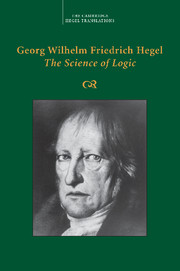Chapter 1 - Mechanism
Published online by Cambridge University Press: 30 September 2021
Summary
Since objectivity is the totality of the concept that has returned into its unity, an immediate is thereby posited which is in and for itself that totality, and is also posited as such, but in it the negativity of the concept has as yet not detached itself from the immediacy of the totality; in other words, the objectivity is not yet posited as judgment. In so far as it has the concept immanent in it, the difference of the concept is present in it; but on account of the objective totality, the differentiated moments are complete and self-subsistent objects that, consequently, even in connection relate to one another as each standing on its own, each maintaining itself in every combination as external. – This is what constitutes the character of mechanism, namely, that whatever the connection that obtains between the things combined, the connection remains one that is alien to them, that does not affect their nature, and even when a reflective semblance of unity is associated with it, the connection remains nothing more than composition, mixture, aggregate, etc. Spiritual mechanism, like its material counterpart, also consists in the things connected in the spirit remaining external to one another and to spirit. A mechanical mode of representation, a mechanical memory, a habit, a mechanical mode of acting, mean that the pervasive presence that is proper to spirit is lacking in what spirit grasps or does. Although its theoretical or practical mechanism cannot take place without its spontaneous activity, without an impulse and consciousness, the freedom of individuality is still lacking in it, and since this freedom does not appear in it, the mechanical act appears as a merely external one.
THE MECHANICAL OBJECT
The object is, as we have seen, the syllogism whose mediation has attained equilibrium and has therefore come to be immediate identity. It is therefore in and for itself a universal – universality, not in the sense of a commonality of properties, but a universality that pervades particularity and in it is immediate singularity.
1. To begin with, therefore, the object does not differentiate itself into matter and form, matter being its presumed self-subsistent universal aspect and form the particular and singular instead; according to its concept, any such abstract differentiation of singularity and universality has no place in the object; if regarded as matter, the object must then be taken to be in itself informed matter.
- Type
- Chapter
- Information
- Georg Wilhelm Friedrich Hegel: The Science of Logic , pp. 631 - 644Publisher: Cambridge University PressPrint publication year: 2010

